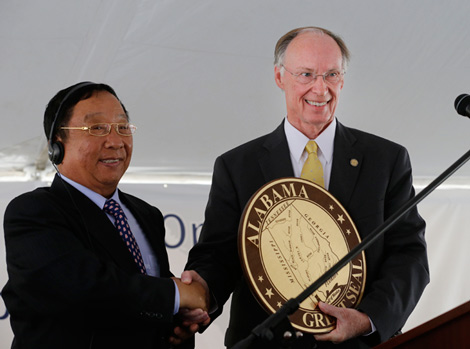US export policy change said to 'help both sides'
Updated: 2014-06-03 07:12
By Jiang Xueqing (China Daily USA)
|
||||||||
Energy | Jiang Xueqing
Fast-rising production of natural gas and crude oil in the United States is prompting talk of changing the country's policy on oil and gas exports. Some bankers who specialize in energy finance contend that easing controls on exports of liquefied natural gas from the US to China will be economically and environmentally beneficial to both countries.
"Expedited approvals from agencies such as the Department of Energy and the Federal Energy Regulatory Commission will benefit LNG exports from the US to China, which is not on the list of free trade agreement countries. This is because LNG exports to countries on the non-FTA list require greater due diligence and approval processes as compared with those on the FTA list," said Paul Clifford, head of project finance in the Americas for Standard Chartered Plc.
Regulations permit LNG exports only to countries that have an FTA with the US. Shipments to other countries face a more complicated process involving a positive determination that the proposed exports would be "consistent with the public interest" of the US.
The "public interest" test encompasses a range of factors, including the impact on natural gas prices, domestic gas supplies and demand, environmental considerations and national security.
In the past three to five years, on the back of significant shale oil and shale gas discoveries, the export role of the US has changed dramatically.
US oil production increased 15 percent in 2013. And according to the Paris-based International Energy Agency, the US will become the world's largest oil producer in 2020.
"There have been some shifts and changes in terms of the way that the US looks at its energy," said Clifford. "We recognize the trend and the strategic importance that the US could play as a new and important source of gas exports."
As of March 24, the administration of US President Barack Obama had conditionally approved seven LNG projects since May 2011, with a daily total of 9.27 billion cubic feet of export capacity, for exports to non-FTA countries such as Japan and India.
Top Obama administration officials are also considering relaxing bans on crude oil exports that were enacted in the wake of the 1970s oil crisis.
US Secretary of Energy Ernest Moniz has said that "the issue of crude oil exports is under consideration" because some of the fast-growing supply of domestically produced oil is unsuitable for refining locally.
About 10 years ago, US refineries invested tens of billions of dollars to upgrade their processing capacity of heavy crude oil. But now there's an increasing mismatch between what their facilities can refine and the production growth of shale oil, which is light oil.
"A lot of people realized that it does make sense to allow light crude to be exported for the US to continue to process heavy crude and help increase the volume of supply globally ... There's a realistic chance that would happen," Clifford said.
While the US is set to become a major natural gas exporting nation, US energy companies have an opportunity to supply part of China's natural gas needs, which are significant as the pace of Chinese economic growth and the rate of urbanization continues to rise.
According to the IEA, during the five years starting in 2013, China will add the combined gas demand of Germany, France and Belgium.
To balance energy security with economic and environmental performance, China is investing in natural gas and LNG for power, residential heating and mass transportation. The National Development and Reform Commission is seeking to raise the share of natural gas consumption in China's primary energy mix from 5.9 percent in 2013 to 10 percent by 2020.
"From the perspective of Chinese LNG importers, sufficient LNG tanker capacity for shipping and adequate third-party gas pipeline system open-access rights form the bedrock of increasing the supply and availability of LNG to a larger Chinese population," Clifford said.
During the process of helping Chinese energy companies explore the US market, successful financial partners must have on-the-ground expertise and deep industry knowledge to support the companies moving offshore and investing in critical natural resource projects.
"Standard Chartered's understanding of the local markets it is in and its specialized focus on the LNG sector have enabled it to be successfully involved in the advising, structuring and arranging of financing for many large international LNG projects," Clifford said.
The bank has the industry knowledge and financial structuring expertise to assist Chinese companies in financing their international energy development strategies, he said.
The bank is actively seeking to support Chinese energy companies go abroad and has longstanding relationships with all the major Chinese energy players.
Contact the writer at jiangxueqing@chinadaily.com.cn
(China Daily USA 06/03/2014 page15)

 Taliban prisoner swap stirs debate in US
Taliban prisoner swap stirs debate in US
 The world in photos: May 26-June 1
The world in photos: May 26-June 1
 Alabama County looks to GD Copper for more jobs
Alabama County looks to GD Copper for more jobs
 Minnesota, Mall of America want Chinese tourists
Minnesota, Mall of America want Chinese tourists
 Halle Berry named the Global Icon at Huading Film Awards
Halle Berry named the Global Icon at Huading Film Awards
 Across America
Across America
 Six awarded McDonald's scholarships
Six awarded McDonald's scholarships
 Ma Lin wins Ima Hogg Concerto Competition
Ma Lin wins Ima Hogg Concerto Competition
Most Viewed
Editor's Picks

|

|

|

|

|

|
Today's Top News
NBC censors Snowden interview
Hagel speech reflects US hypocrisy
US being led a merry chase in eastern Asia
US' containment fantasy
This Titanic will be a tourist attraction
Rapid-fire questions turn up heat on Hagel
Abe, Hagel's accusations rejected
Comfort women shrine dedicated
US Weekly

|

|








